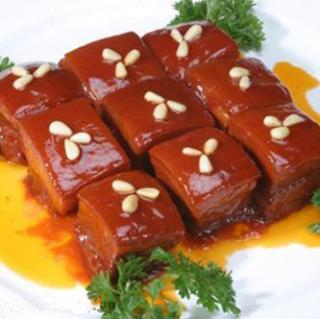
介绍:
更多内容及完整文稿请关注10.7日的微信:英语环球 NEWSPlus
China's eastern Province of Zhejiang includes the core of the vast Yangzi River delta region, a region that has been China's richest, most highly educated, and most progressive throughout much of history. At the same time, the region's economic prosperity and plentiful natural resources have fuelled the growth of gastronomic culture and thus given birth to a unique local cooking style-Zhe cuisine.
With its combination of Hangzhou, Ningbo and Shaoxing cooking techniques, Zhe cuisine is famous for its freshness, mild flavors and mellow fragrance. Hangzhou cuisine is the most famous of the three, and developed more than 280 classic dishes a millennium ago. Our reporter Xiao Hua has more.
Nestling on the banks of the West Lake amid tea plantations, Longjing Manor is a top-class restaurant in Hangzhou where au naturel is the key phrase; it gained global acclaim following a review by famed British food writer Fuchsia Dunlop in "The New Yorker."
Dunlop highlighted the restaurant's devotion to serving traceable food, the idea of tracking food from farm to plate, and the restaurant's ultimate pursuit is to provide dishes in accordance with the season and regional produce, which lies at the heart of Zhe cuisine.
Zhejiang cuisine is the most elaborate form of a culinary style more broadly called "eastern," and found throughout the old states of Wu and Yue and its bordering areas. Historically this region was known as the land of fish and rice -- one of China's most fertile agricultural regions, blessed with an abundance of raw edible materials from its land, rivers, lakes and the sea.
Marco Polo reflected this when he wrote about Hangzhou in the 13th Century. He described 10 market places, where in each, 40 to 50,000 people would gather three times a week.
Being able to enjoy this bounty of raw materials has made local diners' taste buds more sensitive to dishes' flavors, and thus given birth to a typical connoisseur culture.
Hu Zhongying is a Zhe cuisine master chef.
"Hangzhou has varieties of ingredients available to cook with. The famous Zhoushan Fishery is located here, with its abundant marine products; and the mid-province basin is full of vegetables and rice. The world-famous Jinhua Ham, Hangzhou Dragon Well Green Tea and Shaoxing Rice Wine are all vital superior ingredients in this cuisine."
The ancient culinary traditions of Zhejiang still have a wide influence nowadays; and many of the famous local dishes can be traced back centuries or even millennia ago.
Stewed Chicken in Clear Soup is the oldest of the Zhejiang dishes, going back more than 2,000 years. It must be cooked with the very special Shaoxing, locally produced, Yue chicken, which has tender, white meat and crisp bones. It is stewed in light soup, fresh and tasty, and was once used as a tribute for the imperial palace. These days, the chefs of Shaoxing add ham, mushrooms and bamboo shoots as auxiliary ingredients, making it even tastier.
Dongpo Pork is a feature dish of Hangzhou and is believed to have been invented by the famous Song Dynasty poet and government official Su Dongpo about 1000 years ago. It's said that when Su served as the Hangzhou magistrate, the local residents were so happy with his governance that they gave him many gifts out of gratitude. In return, Su shared this dish with the local people, slicing streaky pork into cubes and simmering it in soy sauce and wine on a low heat. The braised pork tasted tender but not greasy, and melted in the mouth. The local people loved it so much that they named the dish after Su, and it became a trademark Hangzhou delicacy.
West Lake vinegar fish is another must-try delicacy from Hangzhou that goes back nearly 1,000 years. The main ingredient for this dish is a freshly caught fish, which is placed in a large pot of boiling water with scallions, ginger, wine and vinegar to eliminate the fishy smell. The fish will be simply boiled for 3 minutes or so and then removed from the pot, drizzled over with a thick sweet-and-sour sauce, and finished with a garnish of cilantro and ginger. This simple cooking method is typical of the philosophy behind Zhe cuisine: to maintain as much freshness as possible.
Longjing Manor chef Zhu Yinfeng is a strict follower of such thinking.
"We believe the essence of the delicacy lies in the preservation of the original taste of the raw ingredient. Everything should taste fresh and pristine. We never use monosodium glutamate or other artificial flavorings that are considered indispensable in the rest of the industry. "
Zhejiang cuisine's stress on freshness can also be verified by the fact that local people's dietary choices change with the seasons. With so many raw materials and twelve months' farming and fishing, there is no need for preserved food.
Dining connoisseurs also go for seasonal foods because they have more cultural meaning. Shen Hongfei is a Hangzhou native and writer.
"Zhejiang people choose their cooking ingredients as the seasons change. For example, during the Tomb-Sweeping Festival people will choose spring bamboo shoots to cook as they at their tenderest. At the very beginning it was a gastronomic choice, but gradually it became a tradition and a cultural token for people habitually to connect their lives with each specific season. "
Chinese gourmets believe that Zhejiang is rich with ancient gastronomic associations. Its cooking wisdom is well reflected in a Chinese gastronomic classic--The Sui Garden Cookbook. It was written by the well-known Qing Dynasty poet and gastronome Yuan Mei, who was dubbed by the food writer Fuchsia Dunlop as "Chinese Brillat-Savarin".
大家还在听

